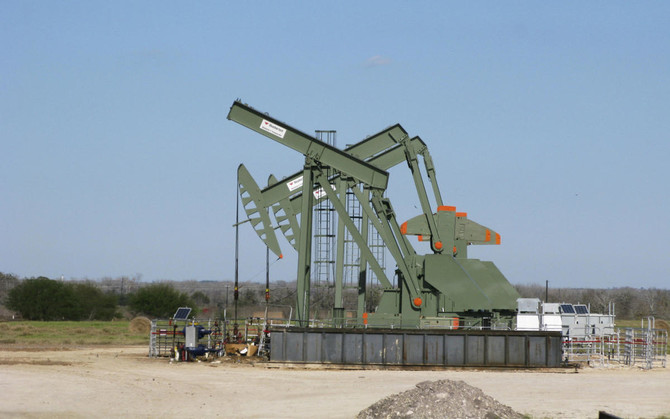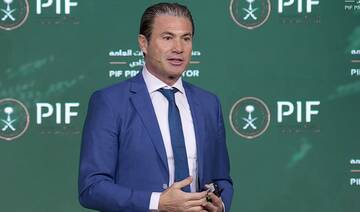LONDON: US shale oil output is set to surge over the next five years stealing market share from OPEC producers and moving the country, once the world’s top oil importer, closer to self sufficiency, the International Energy Agency said on Monday.
A landmark deal in 2017 between OPEC and other oil producers including Russia to curb output to reduce global oversupply materially improved the outlook for other producers as oil prices rose sharply throughout the year, the IEA said.
As a result, US oil output has resumed sharp growth over the past year and is expected to rise by 2.7 million barrels per day (bpd) to 12.1 million bpd by 2023, as growth from shale fields more than offsets declines in conventional supply.
Natural gas liquids will add another 1 million bpd to reach 4.7 million bpd by 2023.
With total US liquids production set to reach nearly 17 million bpd in 2023, up from 13.2 million in 2017, the United States will be by far the world’s top oil liquids producer.
“The United States is set to put its stamp on global oil markets for the next five years,” Fatih Birol, the IEA’s executive director, said in a medium-term market outlook.
Oil production growth from the US, Brazil, Canada and Norway will more than meet global oil demand growth through 2020, the IEA said, adding that more investment would be needed to boost output after that.
Non-OPEC production is set to rise by 5.2 million bpd by 2023 to 63.3 million bpd with the United States alone accounting for nearly 60 percent of global supply growth.
Growth will be led by the Permian Basin in Texas and New Mexico, where output is expected to double by 2023.
“Despite talk of capital discipline and increased focus on returns rather than growth, US producers regrouped quickly when oil prices stabilized and began to rise,” the IEA said.
Production in 2017 rose by 670,000 bpd as drillers added 200 rigs “beating all expectations,” the IEA said.
Last year, the IEA forecast US shale production to grow by 1.4 million bpd by 2022 with oil prices of up to $60 a barrel and by up to 3 million barrels with oil at $80 a barrel.
By contrast, output from OPEC producers will grow at a much slower pace, the IEA said, adding it expected Venezuelan production declines to accelerate offsetting gains in Iraq.
As a result, OPEC’s crude oil capacity will grow by just 750,000 bpd by 2023.
With forecast capacity of 36.31 million bpd, OPEC will be supplying less than 35 percent of global demand by 2023 compared to its usual share of around 40 percent.
Boosted by economic growth in Asia and a resurgent US petrochemicals industry, global oil demand will increase by 6.9 million bpd by 2023 to 104.7 million, according to the IEA.
That means demand growth of around 1.1 percent per year on average.
Despite steep non-OPEC oil production gains, the IEA warned that a decline in mature fields meant more investment was needed across the globe after 2020.
“Upstream investment shows little sign of recovering from its plunge in 2015-2016, which raises concerns about whether adequate supply will be available to offset natural field declines and meet robust demand growth after 2020,” it said.
IEA sees US oil output surge stealing OPEC share in next 5 years
IEA sees US oil output surge stealing OPEC share in next 5 years

PIF’s Humain invests $3bn in Elon Musk’s xAI prior to SpaceX acquisition

JEDDAH: Humain, an artificial intelligence company owned by Saudi Arabia’s Public Investment Fund, invested $3 billion in Elon Musk’s xAI shortly before the startup was acquired by SpaceX.
As part of xAI’s Series E round, Humain acquired a significant minority stake in the company, which was subsequently converted into shares of SpaceX, according to a press release.
The transaction reflects PIF’s broader push to position Saudi Arabia as a central hub in the global AI ecosystem, as part of its Vision 2030 diversification strategy.
Through Humain, the fund is seeking to combine capital deployment with infrastructure buildout, partnerships with leading technology firms, and domestic capacity development to reduce reliance on oil revenues and expand into advanced industries.
The $3 billion commitment offers potential for long-term capital gains while reinforcing the company’s role as a strategic, scaled investor in transformative technologies.
CEO Tareq Amin said: “This investment reflects Humain’s conviction in transformational AI and our ability to deploy meaningful capital behind exceptional opportunities where long-term vision, technical excellence, and execution converge, xAI’s trajectory, further strengthened by its acquisition by SpaceX, one of the largest technology mergers on record, represents the kind of high-impact platform we seek to support with significant capital.”
The deal builds on a large-scale collaboration announced in November at the US-Saudi Investment Forum, where Humain and xAI committed to developing over 500 megawatts of next-generation AI data center and computing infrastructure, alongside deploying xAI’s “Grok” models in the Kingdom.
In a post on his X handle, Amin said: “I’m proud to share that Humain has invested $3 billion into xAI’s Series E round, just prior to its historic acquisition by SpaceX. Through this transaction, Humain became a significant minority shareholder in xAI.”
He added: “The investment builds on our previously announced 500MW AI infrastructure partnership with xAI in Saudi Arabia, reinforcing Humain’s role as both a strategic development partner and a scaled global investor in frontier AI.”
He noted that xAI’s trajectory, further strengthened by SpaceX’s acquisition, exemplifies the high-impact platforms Humain aims to support through strategic investments.
Earlier in February, SpaceX completed the acquisition of xAI, reflecting Elon Musk’s strategy to integrate AI with space exploration.
The combined entity, valued at $1.25 trillion, aims to build a vertically integrated innovation ecosystem spanning AI, space launch technology, and satellite internet, as well as direct-to-device communications and real-time information platforms, according to Bloomberg.
Humain, founded in August, consolidates Saudi Arabia’s AI initiatives under a single entity. From the outset, its vision has extended beyond domestic markets, participating across the global AI value chain from infrastructure to applications.
The company represents a strategic initiative by PIF to diversify the Kingdom’s economy and reduce oil dependence by investing in knowledge-based and advanced technologies.













